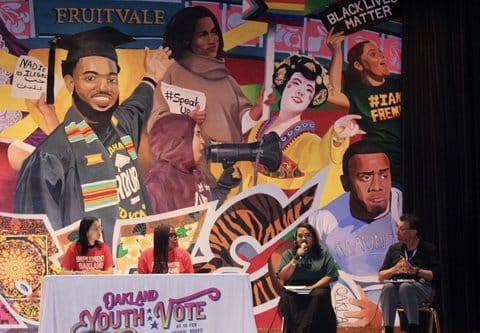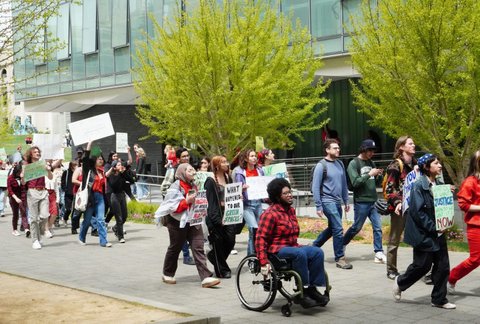
22 Dec Bay Area Organizations Work to Increase Voter Participation, Civic Engagement of Youth

(Sara Tiras / city of Oakland via Bay City News)
By Kiley Russell
Bay City News
When Allyson Chen joined the ultimately successful campaign to allow 16- and 17-year-olds to vote in Oakland Unified School District Board of Education elections, she was a bright-eyed freshman at Oakland High School.
Three years later and Chen, now a freshman at the University of California at Davis, is perplexed about why the city’s Measure QQ has yet to be implemented after it passed with nearly 68% of the vote in November 2020.
“That is the frustrating part because we put so much time and effort into this,” Chen said. “It feels like our hard work has gone to waste because the registrar’s office has not prioritized our measure.”
Chen and other supporters tout the measure’s ability to inculcate young Oaklanders with lifelong voting habits, increase political awareness and even boost the voter participation rates of parents.
Measure QQ is part of a growing effort nationally to increase voter turnout at a time when rates of voter registration and participation can vary widely based on multiple factors, including voter suppression campaigns, the type of election — presidential or midterm, local or national — as well as demographic factors like race, age and income.
>>>Read: Attacks on Voting Rights Evoke Jim Crow Era
For example, voter turnout in the Bay Area increased from 80% of all registered voters in the 2012 and 2016 presidential elections to 85% in 2020, according to data from the Bay Area Equity Atlas.
But during the midterm elections of 2014, turnout was a sparse 50%, then increased to 71% in 2018 but dropped to 57% in 2022.
And in all elections, participation rates for Latino and Asian American voters consistently lag behind those for the overall population, according to the Equity Atlas.
As a partial solution to these persistent trends, Measure QQ was designed to get young people involved in Oakland’s political life at an early age, which many electoral observers believe is a key factor in developing lifelong civic engagement habits.
Sara Tiras, director of the Oakland Youth Commission, said the measure was placed on the ballot by the City Council after lobbying from the Oakland Youth Vote Coalition, of which her organization is a member.
Tiras said supporters regularly reach out to county officials to keep the issue alive and there is some hope that it will be implemented in 2024, when four school board members will be up for reelection.
“The main bulk of the work since 2020 was that we were meeting with the consultants monthly and then meeting with the county whenever we could get a meeting and really working to get a promise and a directive from the Board of Supervisors to the registrar that this needs to be implemented,” Tiras said.
The Alameda County Registrar of Voters office, which is responsible for implementing Measure QQ, didn’t respond to multiple requests for comment, but Tiras said it appears that a combination of technical issues, legal questions and political considerations have been the main barriers to implementation.
“We put so much time and effort into this, especially being students, like it feels like our hard work has gone to waste because the registrar’s office has not prioritized our measure,” Chen said.
Another stalled Oakland effort to boost voter participation is the city’s “Democracy Dollars” program, which was approved by voters as Measure W in 2022 with 74% of the vote, but which also has yet to be implemented.
The program will give eligible Oaklanders $100 in vouchers that they can donate to candidates in local elections.
“The Democracy Dollars program is a really transformative program that’s going to give Oaklanders a greater voice in their local democracy,” said Nicolas Heidorn, executive director of the Oakland Public Ethics Commission, which will administer the funds.
Heidorn said that in a typical election, less than 1% of Oaklanders contribute to campaigns for political office, which means that candidates are often reliant on out-of-town interests, special interests or wealthy individuals to fund their campaigns.
And those Oaklanders who do contribute tend to be wealthy and white, which means low-income residents and communities of color are disproportionately left out of the city’s political decision-making process, according to a 2020 Public Ethics Commission report “Race for Power: How Money in Oakland Politics Creates and Perpetuates Disparities Across Income and Race.”
>>>Read: Obstacles Exclude Disadvantaged Voters from Democratic Process
“But with Democracy Dollars, candidates who have strong community support can fund their campaigns just from the community without needing to rely on other sources,” Heidorn said.
Similar efforts in other cities have been shown to not only increase local political contributions but overall voter turnout, as well, he said.
Seattle’s voucher program, for example, helped boost turnout among first-time eligible voters, people who don’t typically vote, and people who vote infrequently, according to a 2021 study from the Win/Win Network, a progressive research and advocacy organization based in Seattle.
“Voucher programs increase turnout because they cause people to pay more attention and get more engaged in their local elections and invest in candidates, which then leads them to going to the polls and voting,” Heidorn said.
Oakland’s voucher program, estimated to cost about $4 million every two years, was scheduled to launch in 2024, but was delayed until 2026 amid efforts to close the city’s historic $360 million budget deficit.
In addition to ballot box solutions like Measure W and Measure QQ, the Oakland Youth Vote Coalition is developing a type of civics curriculum in partnership with OUSD to teach about the organizing efforts surrounding Measure QQ and introduce students to how the school board functions, its members, candidates and issues.
The idea is to “get them informed of the movement and get them excited and ready to vote, registered to vote and informed on what the school board even does,” Tiras said.
Getting youngsters excited and ready to vote is also one of the goals of the Martin Luther King Jr. Freedom Center’s Youth and Family Civic Engagement Initiative.
The initiative provides civics and leadership classes, cultural exchanges, public speaking coaching and a “nonviolence boot camp.”
It also pairs students with community-based organizations, candidates and election or lobbying campaigns in order to foster lifelong civic engagement and voting habits.
“It’s designed to create an awakening of one’s own position in the world and society,” said Freedom Center executive director Roy Wilson.
That’s a life lesson that Chen took to heart during her years of campaigning for Measure QQ.
“I learned to really advocate for what students’ needs were and how to advocate for other people’s needs, as well as my own,” Chen said. “Because prior to that I was very shy, I was not outspoken and I had trouble just starting simple conversations or telling people what my basic needs were.”
Copyright © 2023 Bay City News, Inc. All rights reserved. Republication, rebroadcast or redistribution without the express written consent of Bay City News, Inc. is prohibited. Bay City News is a 24/7 news service covering the greater Bay Area.






No Comments